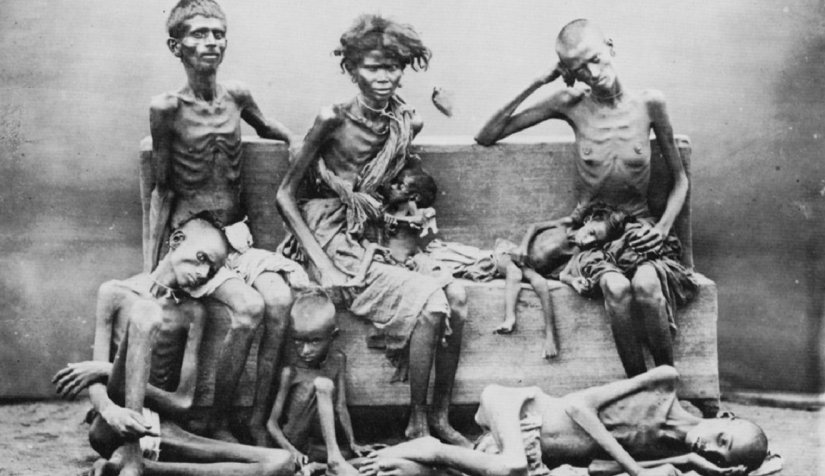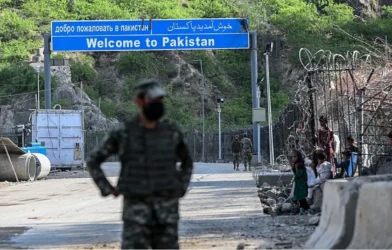Subtotal $0.00
One hundred and fifty years have passed since the Orissa famine, which occurred in 1866 AD, Orissa was at that time affiliated with the state of Bengal, as it was under the administration of British colonialism, which followed India nine years earlier to the British crown after the 1857 AD revolt against the East India Company, which ruled India de facto, after the Muslim and Hindu soldiers who worked for the company rebelled after they received orders from their English officers, ignoring their religious feelings, to grease their guns with fat that was said to contain pork fat forbidden to Muslims and cow fat forbidden to Hindus.
The British suppressed the revolt in a way that is still to this day considered a disgrace to humanity. They even tied the revolutionaries to the barrels of cannons and blew them up, turning Delhi into a ruin after it was the most prosperous and beautiful city in India, killing the sultan's children and placing their heads on his table, then exiled him to Burma.
Delayed monsoon rains solve drought
Despite the importance of the monsoon rains for India, some call it the Indian finance minister, because it is the main source of water on which agriculture and the wealth of the people in general depend, the knowledge of its causes is still the subject of controversy among scientists and specialists until today, which has made it difficult to be able to predict its quantities, plus or minus, and although it begins in the southwest of the Indian subcontinent in June and then spreads to cover the rest of India during the following three months, it is often delayed or falls in quantities that are not in accordance with the Indian government's expectations.
Despite the widespread famines that claimed the lives of tens of millions of Indians under British colonialism, there have been no or few famines since India's independence from British rule, despite the decline in annual monsoon rains by 10% and the lack of significant development in transportation during this period. Railways, ports and transportation systems have not changed much since independence, and the administrative system that ran the sunless British Empire is still recognized as efficient and effective.
Famines in History
As a result of fluctuating monsoons and their impact on agricultural production, many Famines Some claim that there were more than two hundred famines before the arrival of the British colonialists in India, but the famines witnessed by the British rule were the worst of all, in light of direct accusations of the British rule of deepening the causes of the famines, ignoring the suffering of the population and trying to enrich themselves at their expense.
The Old Testament in the Book of Genesis and the Holy Qur'an in Surah Yusuf record the story of the Prophet Joseph, peace be upon him, and how he dealt with the drought that lasted for seven years and avoided the famine that would have befallen Egypt through smart administrative and economic treatments that spared the country and its people from suffering and destruction.
The faithful traveler Ibn Battuta, who settled in the city of Delhi in India during the reign of Shah Muhammad bin Tughlaq, tells us in his journey called "Tahfat al-Nazir fi Gharib al-Asrar wa al-Wajib al-Asrar wa al-Wajib al-Travel," how the state hoarded essential grains in special stores to control price hikes and to face famine. Allama Abul Hasan al-Nadwi in his wonderful book on the history of India, "The Paradise of the Orient and the Shining Light". Unlike the local rulers who found some solutions for their citizens to face the seasonal drought, the British rule was a foreign rule that did not care about the interests of the citizens or the occupied country, except to the extent that it brought them benefits and served their interests.
How did the British contribute to frequent famines?
It cannot be claimed that the British were not aware and aware of how to deal with famines. The story of the Prophet Joseph and how the state intervened to face a potential famine is known to all and sundry, and Britain itself has been exposed to famines that claimed millions of lives, making it impossible to argue that Britain had no hand in the tragedy and that, like the rulers who ruled India before it, it had little to do, a nonsense that does not stand up in the mind of a sane person.
I have proven Numerous studies In terms of thought, the British colonialist adopted a materialistic, supremacist view of dealing with the occupied and colonized countries, which stems from a Darwinian doctrine that sees human beings on levels, the highest of which is the "white man," who views non-Europeans as backward savages who lack the most basic human mental and emotional abilities, and whose mission is to civilize the rest of the world's population by adopting the Western way of life and adopting its concepts and vision of the universe, which is called the "white man's burden. This is the so-called "white man's burden." By colonizing these countries and exploiting their people, he is in fact carrying out a sacred mission imposed on him by his responsibility as he sits at the top of the human pyramid, and the suffering of oppressed peoples is a natural price for acquiring civilization and joining the ranks of Western civilization, considering it the end of what human beings have produced and, in Fukuyama's words, "the end of history."
In terms of behavior, the British were characterized by a great deal of narcissism and contempt for the local culture, considering it to be the result of a backward thought and society. For example, among some people in India, it was believed that famine usually follows the blooming season of the cane flowers, an event that occurs every 65 - 120 years, and in some species every 30 - 35 years.120 years and in some species from 30 to 35 years, as the flowering phase is followed by plucking the bamboo fruits called bamboo rice in large quantities, followed by the death of bamboo forests to be reborn, and the wind comes to spread the bamboo rice like sand on the forest floor, which provides abundant food for rodents, especially rats, which begin to reproduce in huge numbers. When the forest dies, the food is cut off from the rats, which have become in astronomical numbers, so they attack yields, food stores, and farmers' savings, which leads to the disappearance of food stocks, and if this is accompanied by a dry season, the farmers' ability to resist is very weak, so they cannot withstand the lack of food, and famine occurs.
The link between bamboo cane flowering, rat breeding and famine was the result of cumulative experience passed down from generation to generation, not a myth with no scientific basis as claimed by the secularists, as proven by observation and modern studies.
However, historians dispute the desire of the British authorities to initially resist the famine, as the Indian historian Dnyar Patel tells us in his article recently published on the BBC website, intervention in this case, as the Indian historian Dnyar Patel tells us in his article recently published on the BBC website, is, in the eyes of the British rulers, a kind of betrayal because it interferes with the mechanisms of the Malthusian theory, which depends on the economy to correct itself, of course after the world gets rid of the excessive burden on natural resources, here the Indian population, so that economic balance returns to the state of balance again, and even the then governor of Bengal Cecil Beadon (1816 AD-1880 AD, which follows Orissa Not only did he not let the "Malthusian Correction" run its course by not taking the initiative to save people from the famine, but he also banned voluntary civil campaigns to intervene on behalf of the afflicted, claiming that the famine was a divine accident that no government could intervene to solve, while the state of Bengal that he ruled turned out to be exporting two hundred million pounds of rice to Britain at the same time.
Of course, one might say that Sir Bedon's policy was not representative of Britain, but by tracing successive famines, we see the same pattern of treatment, or rather, non-treatment, repeated each time and resulting in millions of victims in all the twenty-five famines during the British rule of India, including the Great Bengal Famine of 1769-1773, which killed about ten million people and was directly caused by the East India Company forcing the local population to abandon grain cultivation and cultivate opium instead.
For example, the famines that occurred between 1860 AD and the beginning of the twentieth century led to the death of fifteen million people in India, which is equivalent in today's scale to about three hundred million people. Patel believes that the policy of non-intervention adopted by the High Commissioner and the first Governor General of India, Lord Lytton (1831 AD-1891 AD), in the Madras famine that occurred between 1876 AD-1878 AD, known as the Great Famine, led to the death of more than five million people, and Lord Lytton is known to believe in the so-called social Darwinism.
Manipulating the Economic Integration of Occupied Countries
In the past, countries relied on the idea of self-sufficiency, especially in the field of food, so they rarely resorted to importing food from abroad. Perhaps the first to enact the practice of importing basic foodstuffs on a large scale were European colonizers, and their goal was to turn entire countries into plantations dedicated to the production of one type of agricultural materials, as they did with the Caribbean islands when they converted them to grow sugar, or Burma to grow rice, or Malaysia to grow rubber. They forced the population to adopt the varieties that complemented their colonial plan, which was to obtain the largest possible production from their colonies, and provided the local population with the food they needed if the local market was not sufficient, by importing it from other colonies, which meant that the local population would always be hostages in the hands of the colonizer, who held the bag of food in his hand, giving it to them if he was satisfied and withholding it from them if they decided to disobey him.
What happened during the Bengal famine, the last famine in India under British occupation, is evidence of this policy, as the local population consumed the food they produced as usual, relying on the British administration to provide the food they needed by importing rice, their most common food, from Burma. With the Japanese occupation of Singapore in World War II and the entire region, food was cut off from India, and this coincided with the occurrence of drought and famine in the western regions of India, which are supposed to be more fertile due to their exposure to monsoon rains in the first place.
The authorities had no mercy on the local population and started recruiting more Indian soldiers to face the possible Japanese attack, and started storing foodstuffs for their military forces at the expense of the people suffering from famine, and when rumors spread among the people that the authorities were storing grain while people were dying of hunger, citizens attacked the port where the grain was stored and found that the late rainwater had caused it to rot and make it unfit for human consumption, which is what happened earlier in the Orissa famine. The East India Company pressured people to leave the textile industry and turn to agriculture, which served the colonial policy that dealt with the colonized countries as production units and humans as tools of production. When they could not produce enough food as a result of the drought, and the prices of food commodities rose, they could not buy them from the markets with the meager returns they received from agriculture.
Conclusion
While Lord Lytton was practicing the most heinous types of murder against the Indian people, he was writing poems of flirtation and sophisticated literary prose. Today, European leaders preach about human rights and the need to respect international laws and the right to self-determination while practicing the most heinous types of ethnic cleansing without blinking an eye or feeling a twinge of conscience, which confirms that Orientalist discourse based on social Darwinism still has the upper hand in the Western mindset.









